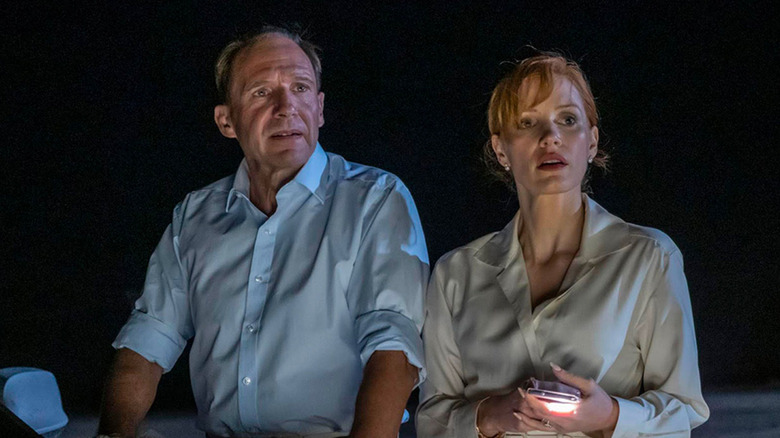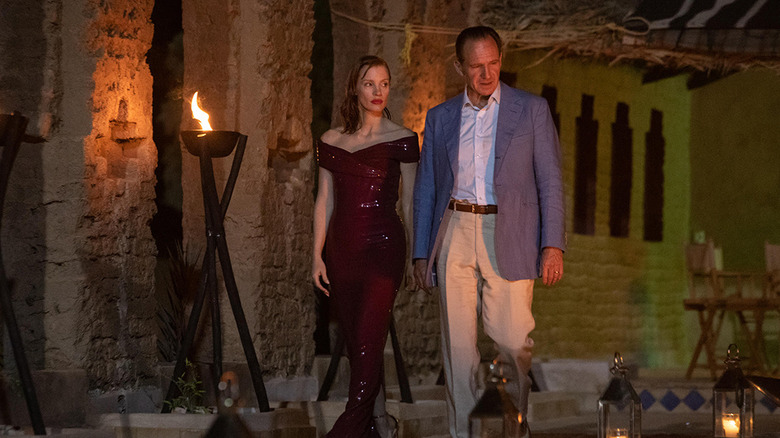The Forgiven Review: A Boozy, Biting Saga Of The Haves And The Have Nots [TIFF 2021]
"The Forgiven" has the feeling of a strong literary novel; the type you pore over after pouring yourself a glass of scotch rather than the type of mindless potboiler you read on the beach. And indeed, this multi-narrative, multi-character saga is based on a novel by Lawrence Osborne. I haven't read the book, so I can't comment on how faithful this adaptation is. But I was impressed with the overall literary feel of "The Forgiven;" a vibe that could easily translate to the printed page.
That's not to say this John Michael McDonagh pic is stuffy and slow. It moves at a steady clip and is loaded with biting humor and sharp observations, spinning a story of obscenely wealthy Westerners who head to Morocco and act like they own the place. As these rich whites drink, screw, and snort coke, the local Muslim population dwells in desert huts, making whatever money they can through the sale of fossils dug up from the sand.
Starting with an opening credit sequence that both runs backward and actually unfolds like an end credits sequence, "The Forgiven" introduces us to rich doctor David Henninger (Ralph Fiennes) and his wife Jo (Jessica Chastain). David is a high functioning alcoholic ("I always thought the high functioning part should cancel out the alcoholic," he observes), almost always with a sweaty cocktail in a highball glass clutched in his fist. Jo used to be a children's author, but she hasn't written a word in years. These two do not seem to be in any form of love. Instead, this appears to be a marriage of convenience. Convenience in the sense that it's just more convenient and less of a hassle for the pair to stay together rather than split up.
David and Joe have been invited to a weekend party at a swank, secluded Moroccan villa owned by their friend Richard (Matt Smith) and his lover Dalley Margolis (Caleb Landry Jones). It promises to be a big bash, and people from all over the globe – but mostly all-white – are flooding in to lounge about the villa, eat fresh fruit that was expensively flown in, drink constantly, pass out, and then wake up and do it all over again.
But before David and Jo can even get to the party they hit – and kill – a local young fossil seller named Driss (Omar Ghazaoui) with their car. The death is an accident – Driss stepped out in front of the car in the dark of night. But David was also clearly drunk, as he always is. And he was speeding and arguing with Jo rather than keeping his eyes on the road. The local authorities get involved, but the wealthy Richard is able to pay them off to make the problem go away, and David and Jo sulk around the party, where the other guests eye them curiously.
David wants to put the entire incident in the past, but the next day, the dead man's father Abdellah (Ismael Kanater, who says so much with his sad eyes while saying so little) arrives at the villa to both collect his dead son's body, and demand that David accompany him back to his village to pay his respects. David is, understandably, resistant to the idea. But things are growing tense, and he eventually relents, deciding to go on the journey.
Here the film splits in half. One half follows David on his journey back to Abdellah's village while the other remains at the villa, showcasing the party guests as they remain oblivious to their privilege. Jo stays behind, too, and almost immediately falls into a fling with droll party guest Tom Day (Christopher Abbott). The scenes at the villa are darkly funny, with Jo snorting thick lines of coke and then immediately claiming she's worried about David, only to then start nuzzling up against Tom. David's story, however, is melancholy and tragic.
God Sees All
"The Forgiven" runs the risk of becoming a thoughtless movie about a vile white man who is taught a lesson by wise brown people, but McDonagh, who also wrote the script, manages to (mostly) avoid that with a subtle touch. However, David does begin to see the enormity of what he's done. Driss was Abdellah's only son, and he'll likely never have another. Abdellah and others who accompanied him to retrieve David are understandably hostile toward the drunken doctor, but David does find some sort of kindness from Anouar (an excellent Saïd Taghmaoui), who seems to be the only member of the group willing to talk to David and not glare at him with rage.
Fiennes is, predictably, fantastic here. He's cruel and cutting when we first meet him, but he grows cowed as he goes on his journey. He ends up sleeping in Driss' tiny bedroom, and his entire attitude of contempt and haughtiness slowly melts away, resulting in a weariness. Is he remorseful? He tells Abdellah he is, but it's to Fiennes' credit that he's able to deliver the apology in such a way that we're not entirely sure if he's being sincere or if he's just trying to save his own neck. Later, he asks Anouar, "Do you think he forgave me?"
The desert locations and production design on the villa are beautiful and sharp contrasts to one another, and they truly feel like entirely different worlds. The people at the party are playing dress-up, lost in their own debauchery while their staff, which consists of locals, look on silently. Like the recent series "The White Lotus," this is a study in oblivious one-percenters who think that they can turn anyone else's land into their own personal paradise, consequences be damned.
There are moments near the end of "The Forgiven" where the entire movie feels as if it's in danger of losing sight of what it's trying to say, and the party-goer moments begin to grow tiresome. But McDonagh sticks the landing, bringing the entire story full circle into a shocking-yet-predictable conclusion that makes us rethink everything we've just seen. "Men always act this way," Abdellah says regarding David's actions at one point. "They think God is blind." In the world of "The Forgiven," God sees all.
/Film Rating: 7 out of 10

